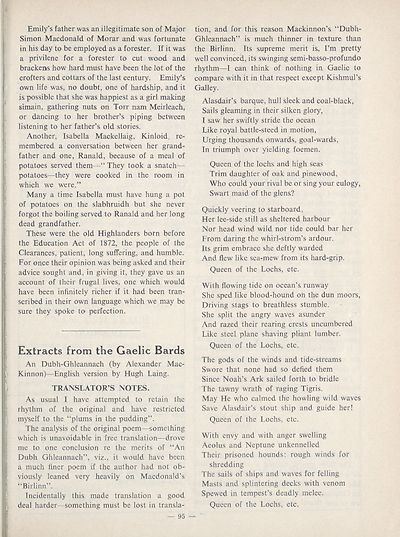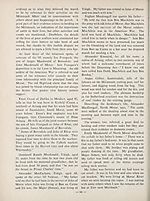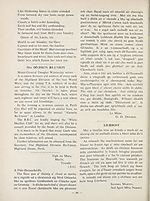An Comunn Gàidhealach Publications > Gaidheal > Volumes 58--62(part), January, 1963--March 1967
(131) Page 95
Download files
Complete book:
Individual page:
Thumbnail gallery: Grid view | List view

Emily’s father was an illegitimate son of Major
Simon Macdonald of Morar and was fortunate
in his day to be employed as a forester. If it was
a privilene for a forester to cut wood and
brackens how hard must have been the lot of the
crofters and cottars of the last century. Emily’s
own life was, no doubt, one of hardship, and it
is possible that she was happiest as a girl making
simain, gathering nuts on Torr nam Meirleach,
or dancing to her brother’s piping between
listening to her father’s old stories.
Another, Isabella Mackellaig, Kinloid, re¬
membered a conversation between her grand¬
father and one, Ranald, because of a meal of
potatoes served them—“ They took a snatch—
potatoes—they were cooked in the room in
which we were.”
Many a time Isabella must have hung a pot
of potatoes on the slabhruidh but she never
forgot the boiling served to Ranald and her long
dead grandfather.
These were the old Highlanders born before
the Education Act of 1872, the people of the
Clearances, patient, long suffering, and humble.
For once their opinion was being asked and their
advice sought and, in giving it, they gave us an
account of their frugal lives, one which would
have been infinitely richer if it had been tran¬
scribed in their own language which we may be
sure they spoke to perfection.
Extracts from the Gaelic Bards
An Dubh-Ghleannach (by Alexander Mac¬
Kinnon)—English version by Hugh Laing.
TRANSLATOR’S NOTES.
As usual I have attempted to retain the
rhythm of the original and have restricted
myself to the “plums in the pudding”.
The analysis of the original poem—something
which is unavoidable in free translation—drove
me to one conclusion re the merits of “An
Dubh Ghleannach”, viz., it would have been
a much finer poem if the author had not ob¬
viously leaned very heavily on Macdonald’s
“Birlinn”.
Incidentally this made translation a good
deal harder—something must be lost in transla-
— 95
tion, and for this reason Mackinnon’s “Dubh-
Ghleannach” is much thinner in texture than
the Birlinn. Its supreme merit is, I’m pretty
well convinced, its swinging semi-basso-profundo
rhythm—I can think of nothing in Gaelic to
compare with it in that respect except Kishmul’s
Galley.
Alasdair’s barque, hull sleek and coal-black,
Sails gleaming in their silken glory,
I saw her swiftly stride the ocean
Like royal battle-steed in motion,
Urging thousands onwards, goal-wards.
In triumph over yielding foemen.
Queen of the lochs and high seas
Trim daughter of oak and pinewood,
Who could your rival be or sing your eulogy,
Swart maid of the glens?
Quickly veering to starboard,
Her lee-side still as sheltered harbour
Nor head wind wild nor tide could bar her
From daring the whirl-strom’s ardour.
Its grim embrace she deftly warded
And flew like sea-mew from its hard-grip.
Queen of the Lochs, etc.
With flowing tide on ocean’s runway
She sped like blood-hound oh the dun moors,
Driving stags to breathless stumble.
She split the angry waves asunder
And razed their rearing crests uncumbered
Like steel plane shaving pliant lumber.
Queen of the Lochs, etc.
The gods of the winds and tide-streams
Swore that none had so defied them
Since Noah’s Ark sailed forth to bridle
The tawny wrath of raging Tigris.
May He who calmed the howling wild waves
Save Alasdair’s stout ship and guide her!
Queen of the Lochs, etc.
With envy and with anger swelling
Aeolus and Neptune unkennelled
Their prisoned hounds: rough winds for
shredding
The sails of ships and waves for felling
Masts and splintering decks with venom
Spewed in tempest’s deadly melee.
Queen of the Lochs, etc.
Simon Macdonald of Morar and was fortunate
in his day to be employed as a forester. If it was
a privilene for a forester to cut wood and
brackens how hard must have been the lot of the
crofters and cottars of the last century. Emily’s
own life was, no doubt, one of hardship, and it
is possible that she was happiest as a girl making
simain, gathering nuts on Torr nam Meirleach,
or dancing to her brother’s piping between
listening to her father’s old stories.
Another, Isabella Mackellaig, Kinloid, re¬
membered a conversation between her grand¬
father and one, Ranald, because of a meal of
potatoes served them—“ They took a snatch—
potatoes—they were cooked in the room in
which we were.”
Many a time Isabella must have hung a pot
of potatoes on the slabhruidh but she never
forgot the boiling served to Ranald and her long
dead grandfather.
These were the old Highlanders born before
the Education Act of 1872, the people of the
Clearances, patient, long suffering, and humble.
For once their opinion was being asked and their
advice sought and, in giving it, they gave us an
account of their frugal lives, one which would
have been infinitely richer if it had been tran¬
scribed in their own language which we may be
sure they spoke to perfection.
Extracts from the Gaelic Bards
An Dubh-Ghleannach (by Alexander Mac¬
Kinnon)—English version by Hugh Laing.
TRANSLATOR’S NOTES.
As usual I have attempted to retain the
rhythm of the original and have restricted
myself to the “plums in the pudding”.
The analysis of the original poem—something
which is unavoidable in free translation—drove
me to one conclusion re the merits of “An
Dubh Ghleannach”, viz., it would have been
a much finer poem if the author had not ob¬
viously leaned very heavily on Macdonald’s
“Birlinn”.
Incidentally this made translation a good
deal harder—something must be lost in transla-
— 95
tion, and for this reason Mackinnon’s “Dubh-
Ghleannach” is much thinner in texture than
the Birlinn. Its supreme merit is, I’m pretty
well convinced, its swinging semi-basso-profundo
rhythm—I can think of nothing in Gaelic to
compare with it in that respect except Kishmul’s
Galley.
Alasdair’s barque, hull sleek and coal-black,
Sails gleaming in their silken glory,
I saw her swiftly stride the ocean
Like royal battle-steed in motion,
Urging thousands onwards, goal-wards.
In triumph over yielding foemen.
Queen of the lochs and high seas
Trim daughter of oak and pinewood,
Who could your rival be or sing your eulogy,
Swart maid of the glens?
Quickly veering to starboard,
Her lee-side still as sheltered harbour
Nor head wind wild nor tide could bar her
From daring the whirl-strom’s ardour.
Its grim embrace she deftly warded
And flew like sea-mew from its hard-grip.
Queen of the Lochs, etc.
With flowing tide on ocean’s runway
She sped like blood-hound oh the dun moors,
Driving stags to breathless stumble.
She split the angry waves asunder
And razed their rearing crests uncumbered
Like steel plane shaving pliant lumber.
Queen of the Lochs, etc.
The gods of the winds and tide-streams
Swore that none had so defied them
Since Noah’s Ark sailed forth to bridle
The tawny wrath of raging Tigris.
May He who calmed the howling wild waves
Save Alasdair’s stout ship and guide her!
Queen of the Lochs, etc.
With envy and with anger swelling
Aeolus and Neptune unkennelled
Their prisoned hounds: rough winds for
shredding
The sails of ships and waves for felling
Masts and splintering decks with venom
Spewed in tempest’s deadly melee.
Queen of the Lochs, etc.
Set display mode to:
![]() Universal Viewer |
Universal Viewer | ![]() Mirador |
Large image | Transcription
Mirador |
Large image | Transcription
| An Comunn Gàidhealach > An Comunn Gàidhealach Publications > Gaidheal > Volumes 58--62(part), January, 1963--March 1967 > (131) Page 95 |
|---|
| Permanent URL | https://digital.nls.uk/127150353 |
|---|
| Description | This contains items published by An Comunn, which are not specifically Mòd-related. It includes journals, annual reports and corporate documents, policy statements, educational resources and published plays and literature. It is arranged alphabetically by title. |
|---|
| Description | A collection of over 400 items published by An Comunn Gàidhealach, the organisation which promotes Gaelic language and culture and organises the Royal National Mòd. Dating from 1891 up to the present day, the collection includes journals and newspapers, annual reports, educational materials, national Mòd programmes, published Mòd literature and music. |
|---|---|
| Additional NLS resources: |
|

